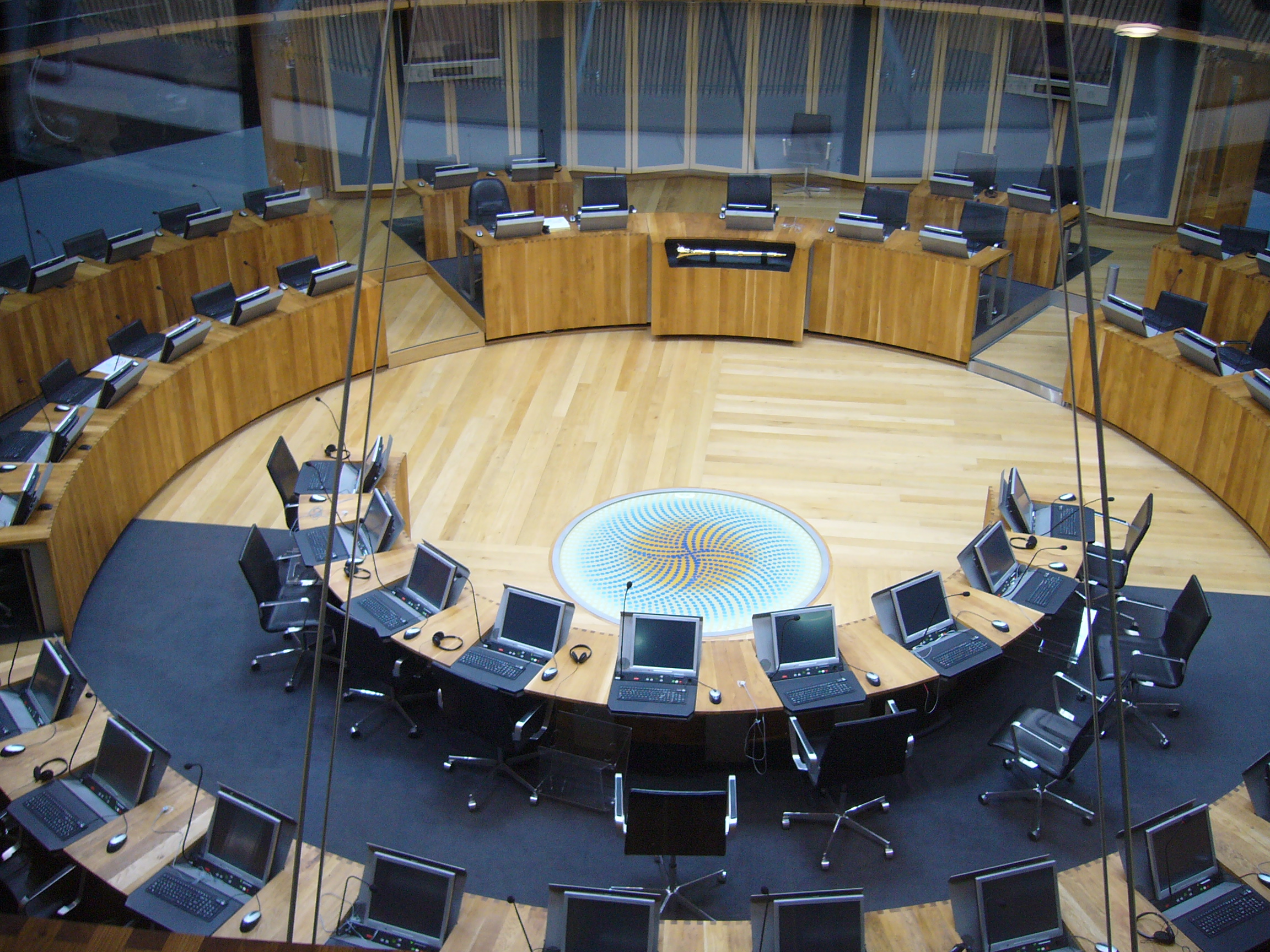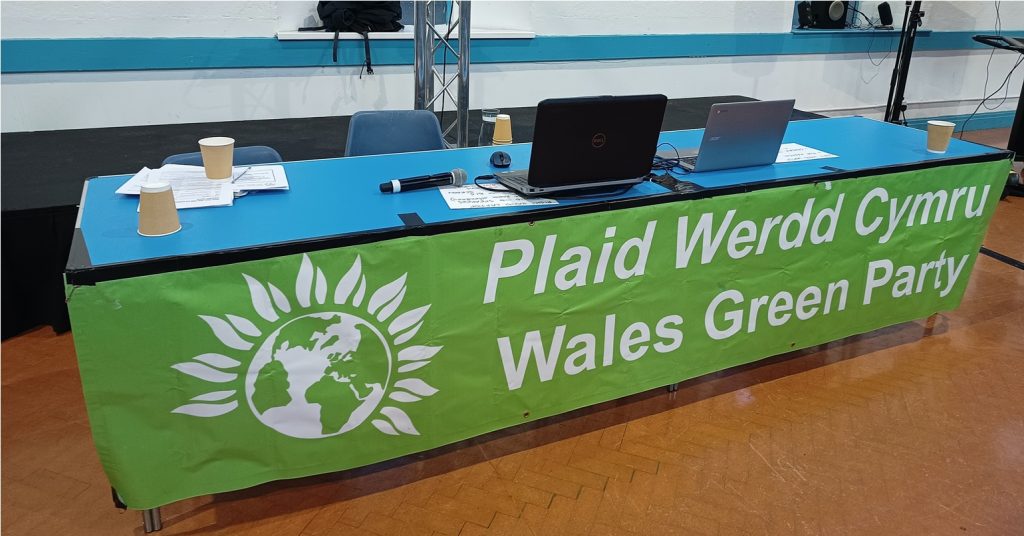Could the Greens win two Welsh Assembly seats in 2016?
 With the General Election predicted to be rather boring in Wales, many people are already thinking about the 2016 Assembly elections.
With the General Election predicted to be rather boring in Wales, many people are already thinking about the 2016 Assembly elections.
The Welsh Assembly elections are more exciting, and are better for smaller parties. The regional seats – decided by a form of proportional representation – attract more parties, and a livelier debate.
Last week I predicted that the Greens could not win an Assembly Seat on their own. I now think I was wrong. I’ve attacked the problem, with a bigger spreadsheet, and some better data about voting intention in Wales.
I’m not trying to predict the entire outcome of the Assembly election. Rather, I’m trying to find a scenario in which the Greens could win an Assembly Seat. And then think about whether this scenario is at all realistic.
So here it is: a scenario in which the Green party win two seats in the Senedd. Decide for yourselves whether you think it stacks up.
First it requires an upward swing for the Greens of between 40 and 60 percent, compare to the results for the last election in 2011. So in the Mid and West Wales region the Greens would need to jump from attracting about 8,500 votes to getting around 12,500. It would mean taking about 6% of the vote. This seems possible given that the Greens have been polling at about 5% across the whole of Wales, and this is one of their more popular areas in Wales. So the question for mid-Wales Green Party activists is: are there another 4-5000 Green voters out there and can they be convinced to vote green by May next year?
South Wales Central is in a similar position. The Green vote would have to jump from what it was in 2011 (10,774) to just under 17,000. A leap of about 55%. This means taking just over 8% of vote. This is at the upper end of what any poll predicts for the Greens across the UK. Are the another 6,000 or so Green votes in and around Cardiff? Let me know in comments what you think.
The other regions (North, South East and South West) are no where near as likely. Getting a seat in any of the would require the Green vote to jump by at least 140%. Or more like 180% in North Wales. I also don’t think there is much chance of the Greens taking a Constituency Assembly seat, as these are elected by Fast Past the Post. So the Mid and West Wales and South Wales Central regional seats are the most hopeful for the Greens.
This scenario also requires the virtual extinction of the Lib Dems. Their share of the vote in Wales would need to fall by about 45%. Labour and the Tories would have to do badly as well. Dropping by 23% and 28% respectively.
Is this possible? Maybe. Cardiff University compiles polling data on voting intention in Wales. They don’t break out the Greens in the data. Their analysis of voting intention in regional Assembly elections shows a 67% increase for “other” parties. (“other” does not include UKIP or Plaid). They also predict the 23% and 28% falls for Labour and the Tories I’ve used in the scenario. And the 45% crash for the Lib Dems. Remember also, that because the regional seats use proportional representation, people have always been more likely to vote for smaller parties. So I think my scenario isn’t completely outlandish.
Of course I couldn’t ignore UKIP in my calculations. The Cardiff University data shows them rising from 10% to 17% in the polls. A jump of 70%. If this is correct it could give UKIP 4 Assembly Members. I was shocked by this at first. But look at it like this: most polls have UKIP at around 16% of the vote. In an electoral system that is designed to better reflect vote share, you’d expect them to win 3 or 4 seats out of the 20 available.
So would this shake up the Senedd? A bit. Labour currently have a majority of 1. In my calculations they lose two seats, wiping out their over all control. But this isn’t that dramatic. If this happens they would probably form a coalition with Plaid, exactly as they did after falling short of a majority after the 2007 elections.
Could the Greens have a role, too?
Alex Randall lives in Machynlleth and has worked on a number of climate change campaigns and projects. He is writing here in a personal capacity.




An important point that needs to be born in mind is the relative vote share needed to get a seat. This is directly related to whether the constituency seats in a region are shared out (which reduces the threshold) or all held by one party (which increases it). Take as an example the 2003 election in Scotland – in the North East, where constituencies were shared out the Greens won a seat with 5.2%, in the West where Labour won all constituencies the Greens failed to win a seat with 5.7%.
So, any Plaid constituency gains anywhere would help the Greens, as would Tory gains anywhere except Mid&West and LibDem gains anywhere except South East, and any Labour gains in Mid&West.
On the issue of pacts, as I just cannot see it happen without the consent of local members, and as Dave rightly points out, that’s usually where the differences are biggest. (Which in a way is a bit of a shame because you could game the electoral system quite easily by putting up a joint list which would be independent from the Plaid constituency candidates and would, for example, have picked up about 12 seats in 2011 instead of the 6 Plaid seats.)
It also needs to be borne in mind that lots can (and most likely will happen) before 2016. For starters, opinion polls for Assembly elections outside the Assembly campaign period have been poor indicators of Assembly election outcomes. In my view this is because so much of the media is dominated by UK politics that people answering Assembly voting intention question while thinking about the UK parties. (Especially if the opinion poll asked for UK voting intentions first, people like to be consistent when they answer a few questions in a row, while they are much less consistent when voting in different years!)
I would certianly expect UKIP to go down (what’s their point as far as the Assembly is concerned?), and Plaid to strengthen. In fact, if there is a Westminster TV debate that includes Leanne Wood I would expect Plaid benefitting from that exposure right now. But will any Plaid upturn be enough to overturn any of the huge Labour majorities in the South Wales regions? I just don’t think we can even remotely predict what will happen to the Green surge and Labour and Plaid and the Tories and UKIP and even the LibDems until we see how the next UK govrnment pans out. Assuming it will be Labour minority government, will it go down in flames or will it be as stable and successful as the SNP after 2007? That will have a huge impact on the Wales election in 2016…
Dave, I can totally see how tedious it must be for you seeing these old arguments re-hashed. It’s not my intention to dismiss the voices of experience in making these articles about pacts. Although you say you’d do it “unhappily” I would be interested in talking to you about the previous pact. The point I’m making in this piece is that the Greens could take an Assembly seat on their own, without a pact. And it seems doing this would not be at the expense of a Plaid seat. Which is positive, I think.
Hi Alex, not really tedious but certainly scary – that a group of people who would tend to think it important that we all understand the history and evolution of political movements and ideas might run such risks by failing to be aware of the history of their own organisation.
If you want to talk more, I’m in the book, so give me a ring.
Too many scenarios! I would have been more impressed if you had taken some time to assimilate the responses to your original proposals, rather than re-presenting your plan with a “jam tomorrow” nod towards the obvious lack of reciprocity in the original.
You say: “I got a lot of feedback. Much of it was highlighting genuine policy differences, differing values and ideologies.” Why don’t you write an account of the feedback that you received, supplemented perhaps by your own analysis of it, and share that with the rest of us?
As a GP member active at Ceredigion, Wales and GPEW levels during the development, implementation and aftermath of the pact which centred on the 1992 General Election, I can say that in my opinion very few of the Wales GP members who were involved in or impacted by the pact would have wanted to go through that experience again.
Three areas of Wales were originally earmarked for this “experiment” (GPEW’s term), but following vehement disputes within WGP it only proceeded in Ceredigion. The levels of abuse, mistrust and conflict generated were spectacular.
A “Plaid/Green” (actually Plaid Cymru) MP was elected, which suited GPEW in Balham (London), which at the time had no one “on the inside” in Parliament. But it is difficult to see what the major concrete benefits were for CGP or for the development of WGP or a broader Green politics in Wales. However the price paid in Wales was all too clear – savage infighting, disruption of personal relationships and trust between members, a poisoning of the party’s public profile, and a loss of members that later hardened into a persistent inability to attract new ones.
I don’t want to go on about this here, but I would happily (no, not happily!) discuss it with anyone who wanted to have more detail. I get a sense of deja vu about the whole thing.
Meanwhile I would point out that all these proposals for electoral pacts rest on the assumption that Plaid is somehow “semi-Green”, and that may not be justified. They are certainly capable of producing literature and manifesto commitments that are impressively Greenish, but my feeling from the days when I was paying close attention is that their Green commitments tend to be superficial, incoherent, rhetorical and painlessly shed. Also, they tend to say different things in different places and fora (constituency, Assembly, Westminster, EU).
As a straw in the wind you could take my own local Assembly Member, Plaid’s Elin Jones. When we were candidates in the 1999 Assembly elections we campaigned together in a group that was advocating the reopening of the Aberystwyth to Carmarthen railway line. When she got elected she dropped this, defending herself by pointing out that various obstacles had been built across the trackbed, which was true and always had been true, and claiming that feasibility studies showed that reopening was impossible. Recently there has been a renewal of public interest in a scheme of this kind, and lo and behold Elin AM is now a staunch supporter of it!
So, pudding and proof, but we already ate this pudding once and got heartburn!